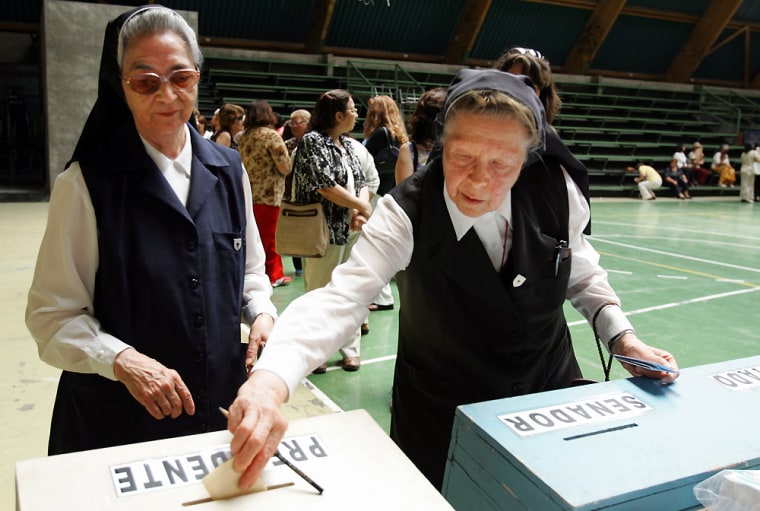A Socialist physician once imprisoned by Chile’s former military dictatorship held a commanding lead in the country’s presidential election on Sunday, but fell short of the majority needed to avoid a runoff with a right-wing rival.
Michelle Bachelet had 46 percent of the vote, election officials said after counting 96 percent of the ballots. Her closest rival, Sebastian Pinera, trailed with 25 percent of the vote, according to returns announced by the government.
If she wins in the runoff against Pinera on Jan. 15, Bachelet would be Chile’s first female leader and Latin America’s fourth, representing the popular center-left coalition in power since 1990. President Ricardo Lagos, who is constitutionally limited to one term, enjoys a more than 70 percent approval rating, and few Chileans seem in the mood for radical change.
Bachelet invited her supporters “to work so that in January we can win.”
“Our results could have been better today, but perhaps our message did not get through to voters,” she said. “But that’s a good reason for us to work harder. We are going to win in second round.”
Pre-election polls have indicated Bachelet would defeat Pinera in a second round of voting.
The three main candidates all support the free market policies that have built one of the most prosperous economies in Latin America.
No role for Pinochet
The election confirmed that Chileans have put Gen. Augusto Pinochet’s legacy behind them. The 90-year-old former dictator played no role in the campaign. He was not even able to cast a vote Sunday, as he remained under house arrest, facing human rights and corruption charges.
The 8.2 million registered voters were also electing one half of the 38-member Senate and all 120 members of the lower house of Congress. Voting is mandatory, but fines are rarely imposed on those who fail to cast ballots.
The third main candidate, the economist Joaquin Lavin, set aside the rivalry of the campaign and offered his support to Pinera as Sunday’s results became clear.
“This is the time for unity,” Lavin said in a speech at his election headquarters. Addressing Pinera, he added, “If we do things right, I am sure you will be Chile’s next president.”
He went to greet Pinera at a downtown hotel, and the two embraced amid applause from hundreds of supporters. Pinera said he and Lavin will join efforts “in the challenges we have ahead.”
“Today we have taken a first step. On January 15th we will take the second step to start changing our country’s history,” he added.
The winner of the run-off will be sworn in on March 11 for a four-year term.
The center-left, pro-government coalition also posted solid gains in elections to replace half the Senate and the full lower house of Congress. While no final figures were available, Lagos said his coalition won a majority in both houses.
Earlier in the day, after voting, Lagos said he and his allies had worked “to make Chile even more democratic and to ensure that we maintain economic growth and that the growth reached all Chileans.”
Female appointees promised
Though Bachelet promises to make half her Cabinet female if elected, there will be few economic changes no matter who is elected. All three major candidates have insisted they will work to reduce the gap between rich and poor and curb the 8 percent unemployment rate and rising crime rate in large cities. The candidates all say they aim at improving the current economic model, not changing it.
Bachelet’s personal history is an important part of her public image; her father, a general, was tortured to death for opposing Pinochet’s 1973 coup. She herself was forced into exile after being jailed with her mother, blindfolded, beaten and denied food for five days while their cellmates were raped. And as a medical student, her aides say, she often treated women who were tortured.
Bachelet has three children from two men, the first of whom she married while in exile in East Germany. Divorce is a touchy issue in Catholic Chile, and Bachelet refuses to discuss her marital status, saying it is a private matter.
Like Lagos, Bachelet has said she will leave it to the courts to deal with Pinochet and other unresolved human rights issues, a position the military has accepted.
